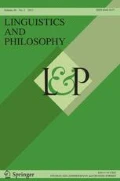Abstract
In this paper I argue that anaphoric pronouns should always be interpreted exhaustively. I propose that pronouns are either used referentially and refer to the speaker's referents of their antecedent indefinites, or descriptively and go proxy for the description recoverable from its antecedent clause. I show how this view can be implemented within a dynamic semantics, and how it can account for various examples that seemed to be problematic for the view that for all unbound pronouns there always should be a notion of exhaustivity/uniqueness involved. The uniqueness assumption for the use of singular pronouns is also shown to be importantto explain what the discourse referents used in dynamic semantics represent.
Similar content being viewed by others
REFERENCES
Chastain, C.: 1975, 'Reference and Context', in K. Gunderson (ed.), Minnesota Studies in the Philosophy of Science, vol. VII - Language, Mind and Knowledge, University of Minnesota Press, Minneapolis.
Chierchia, G.: 1992, 'Anaphora and Dynamic Binding', Linguistics and Philosophy 15, 111–183.
Chierchia, G.: 1996, Dynamics of Meaning, Anaphora, Presuppositions and the Theory of Grammar, University of Chicago Press, Chicago.
Cooper, R.: 1979, 'The Interpretation of Pronouns', in F. Heny and H. S. Schnelle (eds.), Selections from the Third Groningen Round Table, Syntax and Semantics, 10, Academic Press, New York.
Dekker, P.: 1993, Transsentential Meditations, PhD thesis, University of Amsterdam.
Dekker, P.: 1996, 'The Values of Variables in Dynamic Semantics', Linguistics and Philosophy 19, 211–257.
Dekker, P.: 1997, 'On First Order Information Exchange', in A. Benz and G. Jaeger (eds.), Proceedings of Mundial' 97. Munich Workshop on the Formal Semantics and Pragmatics of Dialogue, CIS, München.
Dekker, P. and R. van Rooy: 1998, 'Intentional Identity and Information Exchange', in R. Cooper and T. Gamkrelidze (eds.), Proceedings of the Second Tbilisi Symposium on Language, Logic and Computation, Tbilisi State University.
Does, J. van der: 1994, 'Formalising E-type Logic', in P. Dekker and M. Stokhof (eds.), Proceedings of the Ninth Amsterdam Colloquium, Amsterdam, pp. 229–248.
Donnellan, K.: 1978, 'Speaker Reference, Descriptions, and Anaphora', in P. Cole (ed.), Syntax and Semantics, vol. 9: Pragmatics, New York: Academic Press, pp. 47–68.
Evans, G.: 1979, 'Pronouns, Quantifiers and Relative Clauses (1)', The Canadian Journal of Philosophy 7, 467–536.
Fernando, T.: 1995, 'Are Context Change Potentials Functions?' in H. Kamp and B. Partee (eds.), Context in the Analysis of Linguistic Meaning, Stuttgart/Prague.
Fodor, J. and I. Sag: 1982, 'Referential and Quantificational Indefinites', Linguistics and Philosophy 5, 355–398.
Fraassen, B. van: 1967, 'Meaning Relations Among Predicates', Nous 1, 161–179.
Forbes, G.: 1985, The Metaphysics of Modality, Clarendon Press, Oxford.
Gerbrandy, J. and W. Groeneveld: 1997, 'Reasoning About Information Change', Journal for Language, Logic and Information 6, 147–169.
Groenendijk, J. and M. Stokhof: 1990, 'Dynamic Montague Grammar', in: L. Kalman and L. Polos (eds.), Papers from the Second Symposium on Logic and Language, Budapest, Academia Kiado.
Groenendijk, J. and M. Stokhof: 1991, 'Dynamic Predicate Logic', Linguistics and Philosophy 14, 39–100.
Groenendijk, J., M. Stokhof, and F. Veltman: 1996, 'Coreference and Modality', in Lappin (ed.), Handbook of Contemporary Semantic Theory, Oxford, Blackwell.
Heim, I.: 1982, The Semantics of Definite and Indefinite Noun Phrases, Ph.D. dissertation, University of Massachusetts, Amherst.
Heim, I.: 1990, 'E-type Pronouns and Donkey Anaphora', Linguistics and Philosophy 13, 137–178.
Heusinger, K. von: 1997, 'The Reference on Indefinites', in K. von Heusinger and U. Egli (eds.), Reference and Anaphoric Relations, Kluwer, Dordrecht.
Kamp, H.: 1981, 'A Theory of Truth and Semantic Representation', in Groenendijk et al. (eds.), Formal Methods in the Study of Language, pp. 277–322, Amsterdam.
Kamp, H.: 1988, 'Comments on Robert Stalnaker: “Belief Attribution and Context”', in R. Grimm and D. Merrill (eds.), Contents of Thought, Tuscon, University of Arizona Press.
Kamp, H.: 1990, 'Prolegomena to a Structural Account of Belief and Other Attitudes', in R. Grimm and D. Merrill (eds.), Contents of Thought, Tuscon, University of Arizona Press.
Kamp, H. and U. Reyle: 1993, From Discourse to Logic, Kluwer, Dordrecht.
Kaplan, D.: 1989, 'Demonstratives', in I. Almog et al. (eds.), Themes from Kaplan, Oxford University Press.
Krahmer, E. and R. Muskens: 1995, 'Negation and Disjunction in Discourse Representation Theory', Journal of Semantics 12, 357-376.
Kripke, S.: 1977, 'Speakers Reference and Semantic Reference', Midwest Studies in Philosophy II, 255–276.
Lewis, D.: 1979, 'Scorekeeping in a Language Game', Journal of Philosophical Logic, 8, 339–359.
Montague, R.: 1974, 'Pragmatics', in R. Thomason (ed.), Formal Philosophy, Yale University Press, New Haven, pp. 95–118.
Neale, S.: 1990, Descriptions, MIT Press, Cambridge.
Partee, B.: 1989, 'Binding Implicit Variables in Quantified Contexts', in Papers from the 25th Regional Meeting: Parasession on Language in Context, Chicago Linguistic Society, Chicago.
Quine, W. V.: 1960, Word and Object, Cambridge, MA.
Rooy, R. van: 1997, Attitudes and Changing Contexts, PhD thesis, University of Stuttgart.
Rooy, R. van: 2000, 'Anaphoric Relations Across Attitude Contexts', in K. von Heusinger and U. Egli (eds.), Reference and Anaphoric Relations, Kluwer, Dordrecht.
Sommers, F.: 1982, The Logic of Natural Language, Clarendon Press, Oxford.
Stalnaker, R.: 1970, 'Pragmatics', Synthese 22, 272–289.
Stalnaker, R.: 1978, 'Assertion', in P. Cole (ed.), Syntax and Semantics, vol. 9: Pragmatics, pp. 315–332, Academic Press, New York.
Stalnaker, R.: 1998, 'On the Representation of Context', Journal of Logic, Language, and Information 7, 3–19.
Strawson, P.: 1952, Introduction to Logical Theory, Methuen, London.
Zimmermann, T. E.: 1998, 'Remarks on the Epistemic Role of Discourse Referents', in L. Moss (ed.), Logic, Language and Computation, Vol. 2, CSLI publications, Stanford.
Author information
Authors and Affiliations
Rights and permissions
About this article
Cite this article
Van Rooy, R. Exhaustivity In Dynamic Semantics; Referential And Descriptive Pronouns. Linguistics and Philosophy 24, 621–657 (2001). https://doi.org/10.1023/A:1017597801178
Issue Date:
DOI: https://doi.org/10.1023/A:1017597801178




